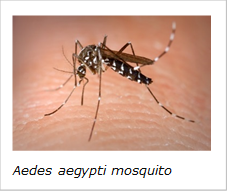University of Arizona researchers have developed a mobile app to help quantify populations of mosquitoes that carry Zika and other viruses, and provide early warning of outbreaks in states from Florida to California.
The mobile app Kidenga will prompt users weekly to report occurrences of “day-biting” mosquitoes at their homes and any symptoms that could be related to mosquito-borne diseases.
This type of “syndromic surveillance” works well with social media, said Kacey Ernst, infectious disease epidemiologist with the Mel and Enid Zuckerman College of Public Health at the University of Arizona.
Ernst said she originally developed the idea for the app as a way of tracking dengue and Chikungunya, two diseases transmitted by Aedes aegypti mosquitoes that have broken out episodically in Mexico, but not in the United States.
The mosquitoes, tiny ankle-biters that are endemic in Arizona and the southern tier of states, also carry the Zika virus, which just became a significant public health threat in the Americas over the past year.
Ernst said she wasn’t surprised to find that the roster of those who signed up early for the app was dominated by women of child-bearing age. Zika is linked to birth defects, including a high incidence of microcephaly or under-developed brains, in outbreaks in South America.
In the United States, local transmission of the disease is currently limited to a few neighborhoods in south Florida, where 42 local transmissions have been reported, according to the U.S. Centers for Disease Control.
Other states, such as Arizona, have the potentially dangerous combination of travel-related cases and the presence of one or both varieties of Aedes mosquitoes that can transmit the disease to others.
Currently, monitoring of the disease depends on reports from doctors to public health agencies, but many who contract the diseases have mild symptoms and never make it to a doctor’s office.
Development of the app, funded in part by the CDC and the Skoll Global Threats Fund, was a collaboration between the UA College of Public Health and the Bio Computing Facility at Arizona Research Laboratories.
Nirav Merchant, the facility’s director, said in an email while traveling in India that the app will “enable easy self-reporting, and provide real time input to researchers.”
Merchant, who supervised development of the app’s program by UA undergraduates in information science and engineering, said collecting that information “in a structured and organized manner over an extended time period is crucial for improving our understanding of how these diseases manifest and spread.”
Ernst said the effectiveness of the app requires a large number of users and the group behind it is embarking on a social-media marketing campaign to reach them. Ernst also wants to enlist educators and their students through other citizen-science programs, such as the Great Arizona Mosquito Hunt.
In addition to reporting on mosquitoes and symptoms, users will have access to the latest information on disease reports by county — initially in the three states of Arizona, Texas and Florida.
Information on mosquito abatement and disease prevention are also available, said Ernst.





